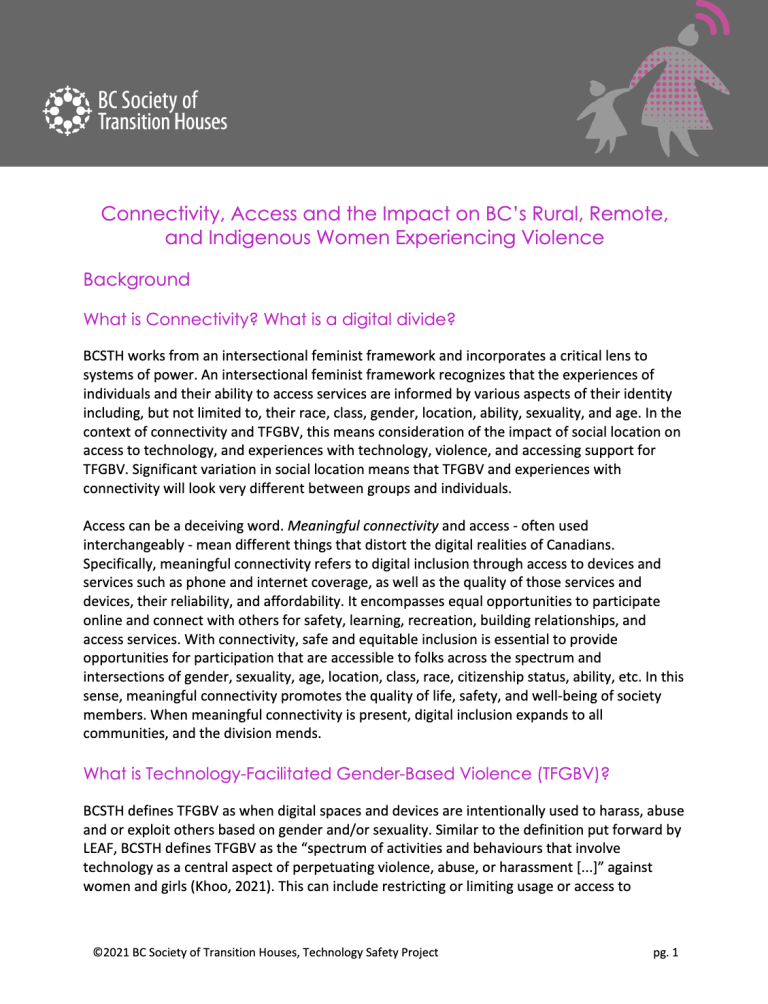6 search results
for
Private sector
For the private sector, phone and internet providers
Women and Girls in Rural, Remote, and Indigenous (RRI) communities face added barriers to meaningful connectivity due to their rurality.
Recommendation 1: Affordable internet and phone programs can build on their work by undergoing a review of their accessibility that applies a barriers reduction approach in order to maximize their impact. Simultaneous work could be conducted related to program equity. (This could include, for example, exploration of innovative policies such as sliding scale payments.)-
Category and theme:
Audience:
Groups affected:
Location of recommendation:
For the private sector, phone and internet providers
Women and Girls in Rural, Remote, and Indigenous (RRI) communities face added barriers to meaningful connectivity due to their rurality.
Recommendation 2: Help invest in connectivity infrastructure (ex. cell phone towers, internet wiring, etc) to expand availability of affordable access plans where they are most needed.-
Category and theme:
Audience:
Groups affected:
Location of recommendation:
For the private sector, phone and internet providers
Women and Girls in Rural, Remote, and Indigenous (RRI) communities face added barriers to meaningful connectivity due to their rurality.
Recommendation 3: Increase speeds offered in affordable access programs to meet targets in order to help facilitate equitable and meaningful connectivity for all.-
Category and theme:
Audience:
Groups affected:
Location of recommendation:
For government, RRI communities, private sector, phone and internet providers
Women and Girls in Rural, Remote, and Indigenous (RRI) communities face added barriers to meaningful connectivity due to their rurality.
Recommendation 4: ISPs could consider partnering with RRIs communities to develop alternatives so that communities have increased choices. This could work in conjunction with increased affordable internet and phone plans, as well as related equity and accessibility reviews (Organizations such as Pathways to Technology and The First Nations Technology Council are working in this field).-
Category and theme:
Audience:
Groups affected:
Location of recommendation:
For NGOs, BCSTH, government, private sector, phone and internet providers
Women and Girls in Rural, Remote, and Indigenous (RRI) communities face added barriers to meaningful connectivity due to their rurality.
Recommendation 5: Research whether additional “light” or “lightweight” versions of websites can be developed in order to decrease demand on the internet for individuals trying to access these sites ( CBC news recently launched “CBC Lite” to make news more accessible to rural and remote Canadians. https://www.cbc.ca/news/canada/montreal/introducingcbc-lite-1.5943819)-
Category and theme:
Groups affected:
Location of recommendation:
For private sector, government, NGOs, BCSTH
Unique contexts specific to RRI communities result in a different significance of meaningful connectivity, as well as distinct challenges, for women in these communities.
Recommendation 15: Policy work moving forward should prioritize connectivity as a safety necessity for anti-violence work and emergency preparedness. This involves actions such as:- Ensuring that emergency alerts can reach all Canadians, especially those in areas that are increasingly impacted by climate change-aggravated disasters (infrastructure issues)
- Organizing collaborative emergency planning with participation from a variety of sectors including, for instance, the private sector – particularly companies with access to connectivity technology and infrastructure – and anti-violence organizations. As pointed out by the report, this planning should be informed by and reflect Indigenous land knowledge and practices.
- Researching and investing in sustainable and ecologically wise connectivity infrastructure that is resilient to climate change to ensure the maximum possible protection of community members’ wellbeing, especially those most vulnerable to post-crisis violence.
- Researching and developing a plan for women who need to call emergency services for experiences of violence but have no phone or internet as a result of the disaster
-
Category and theme:
Audience:
Groups affected:
Location of recommendation:
